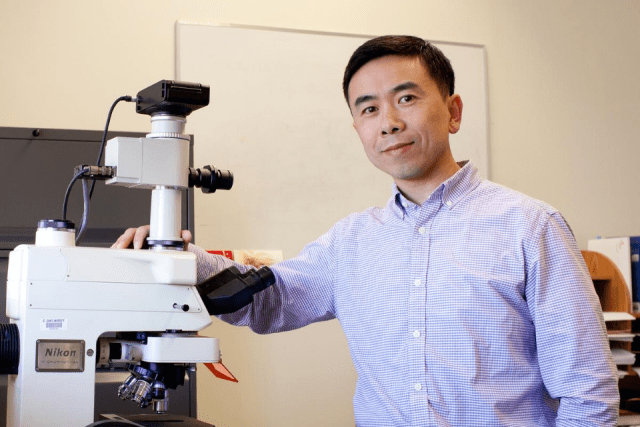
Seeking to better understand the relationship between cell membrane proteins and a genetic kidney disease, Yong Yu, Ph.D., Associate Professor, Biological Sciences, St. John’s College of Liberal Arts and Sciences, was recently awarded a $1.33 million National Institutes of Health (NIH) Research Project Grant (R01) to support his research at St. John’s University as principal investigator (PI).
Along with his fellow PI, Feng Qian, Ph.D., of the University of Maryland, this $2.7 million, multi-PI, five-year grant is entitled, "Ion Channel Function and Regulation of the Polycystin-1/2 Complex in Kidney Physiology and Polycystic Kidney Disease.”
“We are working on two cell membrane proteins named polycystin-1 (PC1) and polycystin-2 (PC2),” explained Dr. Yu. “Mutations in the genes coding these proteins lead to autosomal dominant polycystic kidney disease (ADPKD), one of the most common human genetic diseases.”
According to Dr. Yu, ADPKD affects one in every 400 to 1,000 individuals. People suffering from ADPKD develop multiple fluid-filled cysts in their kidneys, which affect normal kidney function and may eventually cause kidney failure.
“So far, the roles of these proteins in kidney function and how mutations in these proteins cause this disease are largely unknown,” he said. “Understanding the way they work in cells is critical for finding a cure for this disease.”
He explained, “In my lab, we try to understand how proteins function as ‘molecular machines.’ We use state-of-the-art equipment and techniques to detect their structures and monitor their activities, even at the single molecule level. One of the most exciting parts of our research is to figure out how the structure of a protein determines its function, which allows us to explain biological processes or pathogenesis of diseases.”
Dr. Yu, who came to St. John’s in 2012, teaches at both the undergraduate and graduate levels and encourages student participation in his laboratories.
“Both graduate and undergraduate students are actively involved in my research,” he said. “In fact, over the past five years, 10 graduate (Ph.D. and master’s) students and 12 undergraduate students have done research in my lab.”
This five-year R01 grant gives full support to a full-time postdoctoral researcher to work in the lab and funds equipment, lab supplies, publication, conference travel, and more.
“The long-term goals of my lab are to understand the biological functions of PC1 and PC2 and figure out why mutations in these proteins lead to ADPKD,” he said. “We hope our results can enhance our understanding of ADPKD and provide guidance in developing more effective treatments for patients.”
